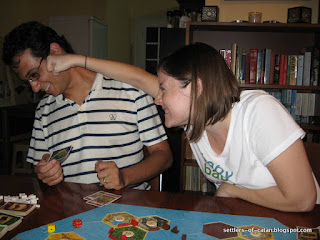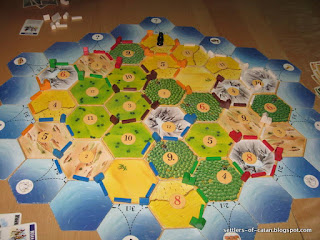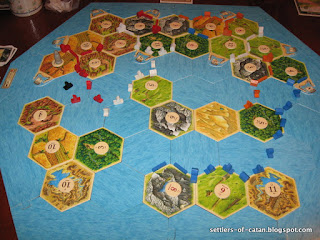Richard (red) placed first. He took a very nice spot with 5 on ore, 6 on clay and 9 on wood. I was second (with orange), so I took a spot that was as good number-wise (5-8-9) but with sheep rather than clay. Then it was Sheila (brown), who opted for a 4-5-11 giving her wood, clay and wheat.
That pretty much used up the obviously good starting positions. John (green) was next. He pondered awhile, then decided to go for the best selection of remaining numbers, which was 5-8-9 on ore and two wheat. We'd been talking about the importance of the ore-wheat strategy... so John was apparently going to try it. Sarah (white) was fifth. She couldn't see anywhere that would be much good - and she likes to use harbours. So she placed her first settlement on the sheep harbour, which bordered two sheep hexes on 8 and 11. Tim (blue) was last. He didn't really have any good places to choose, so decided to opt for as many resources and numbers as possible. He ended up with 4, 8, 9, two 10s and a 12, with theoretical access to all five resources.
Sarah then went for two more sheep hexes with a wood - so all the had available to her was sheep and wood, plus the sheep harbour for trading. A strategy that could work very well, or could be a disaster! John was pleased to find that the coastal 6-10 on clay and wood was still available - giving him the wheat harbour too. He was in a very strong position. He had also inadvertently blocked Tim's first intended move.
Sheila then took two more numbers on the other sheep harbour, I decided I'd opt for three numbers (without any clay) rather than just two on the coast in a rather crowded position, and Richard then took the 4-8 sheep-wheat intersection on the ore harbour, which John had been heading for.

With six players, there can be a fair bit of competition for building spots.
Although Richard played before John, he didn't have such good tiles. And so, twice, John built streets that blocked Richard's plans:

So he built in other directions. Play moved reasonably fast, so that settlements and cities started to spring up all around the island of Catan.

Tim was in the lead at this stage, with six points. John and I both had five, Richard and Sarah both had four, and Sheila had three.
Richard took the longest street first:

Then, rather than taking Sheila's last building spot, I realised that I could build inland to extend my street, and also gain a useful new spot on a 5-ore and 10-wheat (and 2-ore... but that was unlikely to be much use to me). Richard and Sarah had both hoped for that spot.

So I now had the longest street, and nine points. Richard was next with seven. Tim and John each had six points, Sarah had five, and Sheila - whose numbers just weren't being rolled - was trailing with three.
Then Richard extended his road, and took the longest street card back again:

.. which now put him in the lead with nine points, and me in second place with seven, jointly with Tim and John who had each built another settlement in the meantime. Sarah had six, and Sheila four.
By this stage, resources were being gathered faster and faster. The extra 'building phase' in between turns allowed us all to build - so we didn't lose much to the robber - and cities came rapidly, with an abundance of ore and wheat. I joined up my two sections of street, and took the card back from Richard - who had unfortunately wasted a few resources by extending his long street without providing any new building spots.

So, at this stage, Tim was in the lead with ten points. John and I each had nine, Sarah had eight, Richard had seven, and Sheila was still trailing with five.
Most of us had run out of building spots at this time, so all we could do was build cities (if we had any left - Tim didn't by this stage) or buy cards.
Richard and I each built a new city:

So I now had ten points, and was jointly in the lead with Tim.
But John, who had started with such a good position, was able to trump us all. He was the first person to play a third knight card, giving him the largest army - and then turned over a victory point card:

So John was victorious, with twelve points.















































